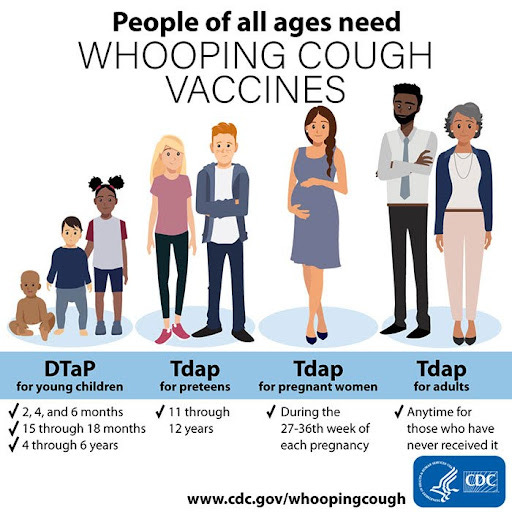Are there more cases of whooping cough than normal?
There have been over 6 times as many cases of whooping cough compared to this time last year. So yes, cases are up. Now is a good time to make sure you are up-to-date on this vaccine.
As we close out 2024, your support of Those Nerdy Girls is now more important than ever. A gift today helps us continue providing trusted, evidence-based health information when our communities need it most. Thank you for standing strong for science!
Are there more cases of whooping cough than normal?
There have been over 6 times as many cases of whooping cough compared to this time last year. So yes, cases are up. Now is a good time to make sure you are up-to-date on this vaccine.
Whooping cough (also known as pertussis) is caused by infection with the bacteria Bordetella pertussis. It causes respiratory symptoms such as runny or stuffy nose, low-grade fever, and cough that makes a high-pitched “whoop” sound, hence the name. Severe cough caused by this illness can lead to injuries like broken ribs and hospitalization in older adults. It is also particularly dangerous for newborns as it can cause life-threatening pauses in breathing and cyanosis-i.e., skin turning blue. About 1 in 3 newborns with whooping cough are hospitalized. People are also very contagious (for up to several weeks). While cases of whooping cough declined during the first few years of the COVID-19 pandemic, there has been a return to the same (or even greater) number of cases as before the onset of the pandemic.
Fortunately, there is a vaccine available!
Unfortunately, vaccination rates in school-age children have been on the decline in recent years ☹️. Others of us may have gotten behind on getting our next dose (oops).
The key time points for this vaccine are:
✅ 2, 4, and 6 months, between 15-18 months, and between 4-6 years (5 doses of the DTaP vaccine)
✅ 11-12 years (one dose of the Tdap vaccine)
✅ Adulthood (one dose of the Tdap vaccine every 10 years)
✅ Pregnancy (one dose of the Tdap vaccine during the 3rd trimester of *each* pregnancy)
Re-upping your protection against pertussis at these points is important, as vaccine effectiveness wanes substantially over time. Getting vaccinated during each pregnancy helps protect each new baby in the first weeks after birth. High rates of vaccination against pertussis in a community can also serve to lower the chances newborns get exposed before they have the chance to get vaccinated.
If you aren’t sure if you are due for another shot, you can check your vaccination status with your clinician or your state vaccine registry and Tdap shots are available at your local pharmacy or clinical office if you are due. New grandparents, or anyone who is going to spend any time around newborns, should 100% make sure they are up-to-date on this vaccine.
ICYMI - Digest of Recent Posts:
Families/Kids, General Health, and Infectious Disease: How can I stop the spread of a Norovirus “stomach flu”?
Staying Safe and Families/Kids: How can I stay healthy as I celebrate the holidays with my family and friends this season?
General: Light-filled Celebrations Across the World!
Reminder that we now have an online store filled with amazing nerdy merchandise.
Your purchases will help financially support the science communication mission of Those Nerdy Girls.
P.S. We’d love to see pics of you and your friends and family sporting their new TNG swag. You might even be featured in our shop! Email us your pics at info@dearpandemic.org
Like what you read? Please share it with others!
If you have a question, let us know!
We read every question and use them to inform our upcoming content, though we are unable to respond to each specific question.




